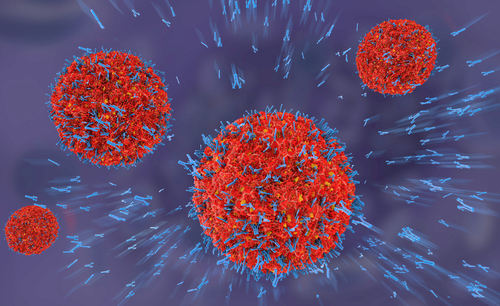STRO-002, an investigational antibody-drug conjugate being developed by Sutro Biopharma, is safe and shows promising efficacy in women with advanced ovarian, fallopian tube, or primary peritoneal cancer, early Phase 1 clinical data show.
The findings were presented during the recent AACR-NCI-EORTC Molecular Targets and Cancer Therapeutics Conference 2019 in Boston, in the poster “Antitumor activity of STRO-002, a novel anti-folate receptor-α (FRα) antibody drug conjugate (ADC), in patient-derived xenograft (PDX) models and preliminary Phase I dose escalation safety outcomes in patients with ovarian carcinoma (OC).”
An estimated 80% of ovarian cancers have high levels of the folate receptor alpha (FRα) protein. STRO-002 is an antibody-drug conjugate that specifically targets FRα. Once the antibody binds to a cell positive for FRα, it releases a toxic compound, killing the cancer cell without harming healthy cells.
In a mouse model of endometrial cancer, where FRα is also produced in excess, treatment with STRO-002 significantly inhibited tumor growth, with the extent of its effects being mostly dependent on the FRα levels within tumor cells.
While the treatment had no effect in cancer cells lacking the receptor, it significantly inhibited tumor growth in four of six models with very high levels of FRα, the researchers showed. In models with low and medium FRα levels, STRO-002 also had some anti-cancer activity, but to a lower extent.
The positive results have led to an open-label Phase 1 clinical trial (NCT03748186) designed to study the safety and early efficacy of increasing doses of STRO-002 in women with advanced epithelial ovarian, fallopian, or primary peritoneal cancer, as well as endometrial cancer. The study is ongoing and recruiting participants in the United States.
The trial will be conducted in two parts, a dose-escalation part expected to find the most suitable dose to be used in future Phase 2 clinical studies, and a dose-escalation part meant to study the safety and efficacy of the established dose. While the first part will only include patients with ovarian, fallopian tube, or primary peritoneal cancer, part 2 will include a group of patients with these cancers and another with endometrial cancer.
To date, 13 patients have been included in the first part of the trial and given STRO-002 via intravenous infusions every 21 days, in doses ranging between 0.5 mg/kg and 6 mg/kg. Participants had received two to eight prior lines of therapy.
Results suggest that STRO-002 is in general safe and well-tolerated. Most of the treatment-related adverse events reported (95%) were mild in severity, and included nausea, fatigue, headache, insomnia, vomiting, abdominal pain, and dizziness.
Higher doses of STRO-002 were associated with more severe adverse events (grade 3) including small bowel obstruction and neutropenia (low levels of neutrophils).
One woman achieved a partial response and a 100% reduction in the CA-125 cancer biomarker after five administrations of 2.9 mg/kg of STRO-002. Also, two other participants had confirmed stable disease at cycles five and 10 of treatment, and three had unconfirmed stable disease.
“The emerging safety profile of STRO-002 is very promising,” Arturo Molina, MD, chief medical officer at Sutro Biopharma, said in a press release. “Antibody-drug conjugates offer the ability to preferentially kill tumor cells while avoiding healthy cells. Early signs of clinical benefit are encouraging, and we believe STRO-002 has potential in this heavily pre-treated population of patients with advanced, relapsed and refractory ovarian cancer.”

